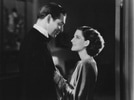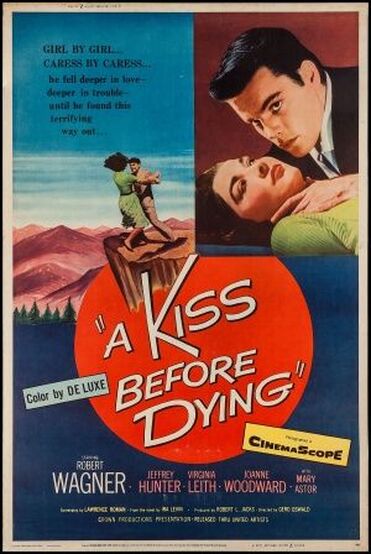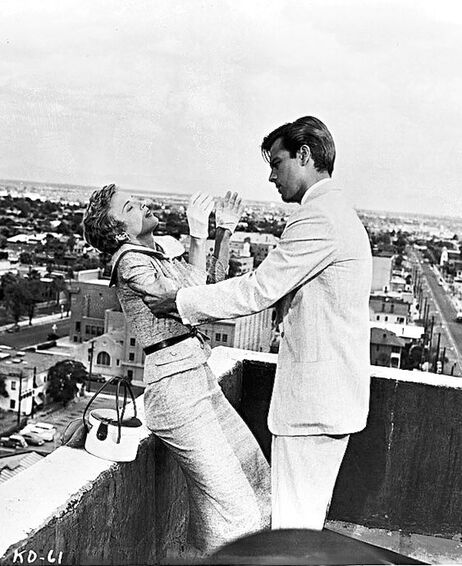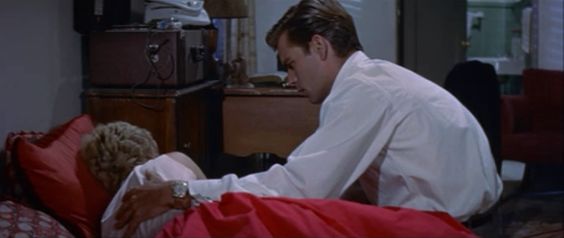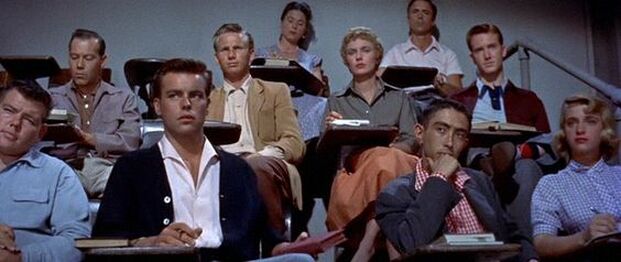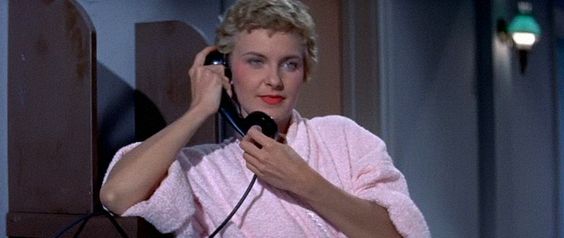(1956)A Kiss Before DyingDirected By: Gerd Oswald
Starring: Robert Wagner, Joanne Woodward, Jeffrey Hunter, Virginia Leith Studio: Crown Productions (United Artists) IMDB Rating: 7 The week we started watching The Last Movie Stars on HBO Max. The 6-part series debuted this past summer and recounts the careers of Paul Newman and Joanne Woodward, who were married for 50 years, until Paul’s death in 2008. The construction of the series is fascinating in that director Ethan Hawke took transcribed interviews conducted by Newman for a memoir he never produced and has actors read parts to tell the story. George Clooney “play” Newman, for instance, and Laura Linney “plays” Joanne Woodward. The original tapes of Newman’s interviews were destroyed by Newman, but in finding the transcripts Hawke creatively brings them together, paired with archival footage, scenes from the pair’s films and interviews conducted to reinforce the story and its meaning. In watching the first two episodes, two things became evidently clear to me; Woodward’s willingness to take a back seat to Newman’s career only partially fulfilled her, and I really haven’t seen many performances by Woodward, outside several of the 16 she made with Newman.
|
In telling the love story of Woodward and Newman one often forgets that Newman was previously married and had three kids with fellow actor Jackie Witte. Newman and Woodward carried on an affair for 5 years before Newman finally relented and divorced. Their early married life had Woodward in the spotlight career wise, with Newman struggling to break through in movies after spending most of his early career on television. Newman’s break through was, in fact, only granted because James Dean died and Newman was given his part in 1956’s Somebody Up There Likes Me. Woodward, on the other hand, won the Best Actress Oscar just a year later for her performance in The Three Faces of Eve. She was viewed as an actress of great talent and potential, while Newman was characterized as “Brando light” by the press and studio executives.
Evidence of Woodward’s talent was evident before Three Faces in her second credited film role and the focus of today’s column, A Kiss Before Dying, from 1956. While essentially a “B” picture, released independently through United Artists, the film is a daring story of a cold-blooded killer trying to raise his station in life through his attachments to two wealthy sisters. The open scene itself tests the boundaries of the Production Code by show an obviously unmarried couple discussing first pregnancy and then raising the idea of an abortion or miscarriage, the later 2 items more hinted than named. In either case, pregnancy before marriage was rarely allowed in the restrictive production code era, let alone the idea of hoping for the fetuses demise as a positive outcome for the characters.
Robert Wagner plays the over achieving boyfriend, once feted as the “most likely to succeed” and most popular, according to clippings on his bedroom wall, but he is also an isolated mama’s boy, who keeps his romance to Woodward’s Dorothy Kingship a secret from everyone. As his nefarious plot to rid himself of the baby and then the girlfriend become thwarted by chance or stupidity, Wagner’s Bud Corliss becomes sort of a hapless Tom Ripley. When he has to continue to murder to cover his tracks, his control of the situation weakens, but not his resolve, as he seduces Dorothy’s sister and ingratiates himself with the sisters’ father. He is evil and calculating, so he is as about an interesting character in the career of the normally stiff and dull Wagner’s career.
Robert Wagner plays the over achieving boyfriend, once feted as the “most likely to succeed” and most popular, according to clippings on his bedroom wall, but he is also an isolated mama’s boy, who keeps his romance to Woodward’s Dorothy Kingship a secret from everyone. As his nefarious plot to rid himself of the baby and then the girlfriend become thwarted by chance or stupidity, Wagner’s Bud Corliss becomes sort of a hapless Tom Ripley. When he has to continue to murder to cover his tracks, his control of the situation weakens, but not his resolve, as he seduces Dorothy’s sister and ingratiates himself with the sisters’ father. He is evil and calculating, so he is as about an interesting character in the career of the normally stiff and dull Wagner’s career.
for the good in Corliss as the contradiction to her father’s cruelty. She is needy and beautiful, capable of providing Bud the social climb he desperately needs, but the pregnancy becomes too great a burden, which puts the murderous plot in motion. Even in her innocent belief in Bud, it is still clear that she would be capable of having a pre-marital sexual relationship. It’s a delicate balance, but her performance is a wonderful prelude to Woodward’s knowing, yet insecure, Clara Varner opposite Newman in 1958’s The Long Hot Summer. The two characters speak to Woodward’s ability to convey depth and nuance in characters that are damaged, if not broken, and would mark what looked like a promising career; a career that was ultimately overshadowed by Newman’s.
While you can, stream The Last Movie Stars for its wonderful portrayal of the Newman/Woodward love affair because it captures the essence of any good marriage, which is compromise, partnership and self-sacrifice. Along with The Three Faces of Eve, The Long, Hot Summer and A Kiss Before Dying, check out Woodward in The Fugitive Kind, with Marlon Brando & Paris Blues with Newman and Sidney Poitier.
While you can, stream The Last Movie Stars for its wonderful portrayal of the Newman/Woodward love affair because it captures the essence of any good marriage, which is compromise, partnership and self-sacrifice. Along with The Three Faces of Eve, The Long, Hot Summer and A Kiss Before Dying, check out Woodward in The Fugitive Kind, with Marlon Brando & Paris Blues with Newman and Sidney Poitier.
